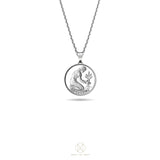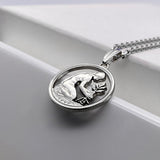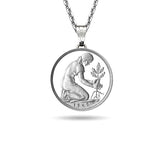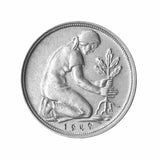Image on the 50 Pfennig coin
Years 1949/1950 and from 1966 - 2001 available on request.
Gerda Jo Werner on the back of the 50 Pfennig coin

The well-known image of the tree planter was created in 1949 in the aftermath of the 1948 currency reform by Gerda Jo Werner's husband for a design competition announced by the then-responsible board of the Bank deutscher Länder ( later: Deutsche Bundesbank ). For the 50-pfennig coins, a motif was sought that would embody the reconstruction of Germany after the Second World War. In order to participate in this competition, Richard M. Werner took an existing series of nude drawings that he had made of his wife and quickly supplemented the images with covering cloths and the oak sapling in her hands. The shadow-forming contours of the originally drawn body parts, typical of the original graphic, are also very well preserved on the later coinage, almost creating the impression of translucent clothing.
Werner's design of the young oak planter was immediately convincing and was unanimously selected. According to his own statement, he wanted to honor the countless women who cleared the rubble, as well as the numerous tree planters, also known as "culture women," who were active in reforestation . By choosing this simple image based on the model of his then-pregnant wife, the largest symbolic monument to date, at least in terms of numbers, was created for all these women.
Richard Martin Werner died shortly after the first coins bearing his wife's image were minted. For a long time, it was unknown who "the 50-Pfennig woman" was; she was generally considered an idealized representation. In the late 1980s, a journalist researched the topic. As a result, she was interviewed by Frank Elstner on the ZDF program "Menschen" in 1987. Only then did the connection become known nationwide. Mrs. Werner subsequently appeared on other television programs and was frequently interviewed, particularly on the introduction of the euro and the "farewell to the D-Mark ." She expressed modest pleasure and gratitude for her late fame.
From the end of the 1990s onwards, several 50-pfennig collection campaigns, some local, some development-oriented and international, were initiated, primarily in Hesse, which financed the planting of trees in memory of the women involved in reconstruction and also in honor of Gerda Jo Werner, from an environmental protection perspective.
From their first issue on February 14, 1949, until the introduction of the euro on January 1, 2002, the 50-pfennig coin was the official means of payment in the Federal Republic of Germany. A total of well over 2 billion coins were minted. The 50-pfennig coin was considered the most visually appealing of all the Deutsche Mark coins in circulation. It is also the only one in the Federal Republic depicting a woman.











